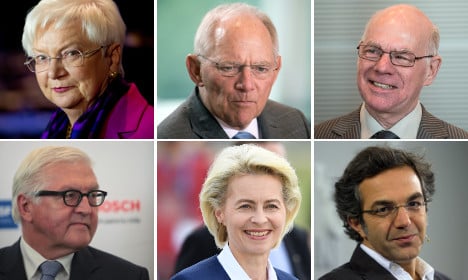Gauck took the office of President and gave it its honour back, after Christian Wulff resigned in disgrace after being caught up in a corruption scandal.
The pastor from east Germany was not a professional politician, and was seen to have given moral authority to his role with his interventions on the refugee crisis and the Armenian genocide.
Now the major political parties have started jostling to put one of their own back into Berlin’s splendid Bellevue Palace, with heavyweights from all the major parties seen as potential candidates.
Norbert Lammert – the outspoken one
 Photo: DPA
Photo: DPA
The outspoken head of the Bundestag (German parliament) is a senior figure in Angela Merkel’s Christian Democratic Union (CDU). He is well known for calling a spade a spade, having fought for official recognition of the Armenian genocide and for clearer recognition of Germany's own historical war crimes.
He is also seen as being liberal enough to appeal to the centre-left Social Democratic and Green parties, Spiegel reports.
But he is said to have a tense relationship to Merkel. And, without her support, his ambitions would be scuppered.
Wolfgang Schäuble – the truculent one
 Photo: DPA
Photo: DPA
If Germany is looking for a name to fill the elegant halls of Bellevue Palace which has recognition on the world stage, they need look no further than the current Finance Minister.
Schäuble has been one of the big guns of German politics for over two decades and few people are as respected, albeit often grudgingly, within Germany than the southern warhorse.
But if they want someone whose visage warms the most hostile of foreign hearts they should probably avoid picking the man despised by southern Europeans as the stony enforcer of austerity and cuts.
And there is another thing – Gauck stood down because, at the age of 76, he felt that he would struggle with the rigours of the role. At 74, Schäuble isn’t exactly a spring chicken himself.
Ursula von der Leyen – the 'I'd rather be Chancellor' one
 Photo: DPA
Photo: DPA
The current Defence Minister is known for her ambition. And as the international face of the Federal Republic, there is no doubt she would make an impression.
Besides having managed a successful career while having seven children, she is sharp and incisive, and doesn’t shirk from bold political decisions.
Her work at the Defence Ministry, where she has instituted reforms and growth against the will of a reluctant public demonstrates her strength.
But von der Leyen may well have her sights set on a different job.
General elections are also happening in 2017. If Chancellor Merkel decides she can’t deal with the haters on the refugee crisis any longer, von der Leyen may be the favourite to take her place.
Gerda Hasselfeldt – the bridge-builder
 Photo: DPA
Photo: DPA
The head of the conservative Bavarian Christian Social Union (CSU) in the Bundestag is the name on many lips as a potential presidential candidate.
She is renowned as being quietly efficient. What’s more, she reportedly has a good working relationship with Merkel.
Nominating her could be good politics on Merkel's part. Relations between the CDU and CSU are at an all time low after CSU boss Horst Seehofer threatened to take the Chancellor to court over her refugee policy.
Nominating Hasselfeldt for the job could be a sign Merkel wants to bury the hatchet and build bridges before next year's national elections.
Frank-Walter Steinmeier – the statesman
 Photo: DPA
Photo: DPA
The Foreign Minister would be the preferred candidate of the centre-left Social Democratic Party (SPD).
He has experience as well as name recognition, and he fits the bill of an elder statesman.
But many people could view him as placing alliances over scruples after he denied last year that the massacre of Armenians by the Ottoman Empire in 1915-1916 was a genocide.
Besides that, the SPD will have to persuade other parties to back him, as their parliamentary representation is so small.
Navid Kermani – the thinker
 Photo: DPA
Photo: DPA
The main name being banded about as a possible president who doesn’t belong to the political class is that of Navid Kermani, an author of Iranian heritage.
His books on Middle Eastern and Central Asian politics are well respected and he has won some of Germany’s most prestigious book prizes.
He is no political naif either. A speech he gave to the Bundestag in 2014 on the successes of German integration policies was widely praised, Tagesspiegel reports.
Kermani would be seen as a moral voice in the mould of Gauck who could rise above party political disputes.


 Please whitelist us to continue reading.
Please whitelist us to continue reading.
Member comments